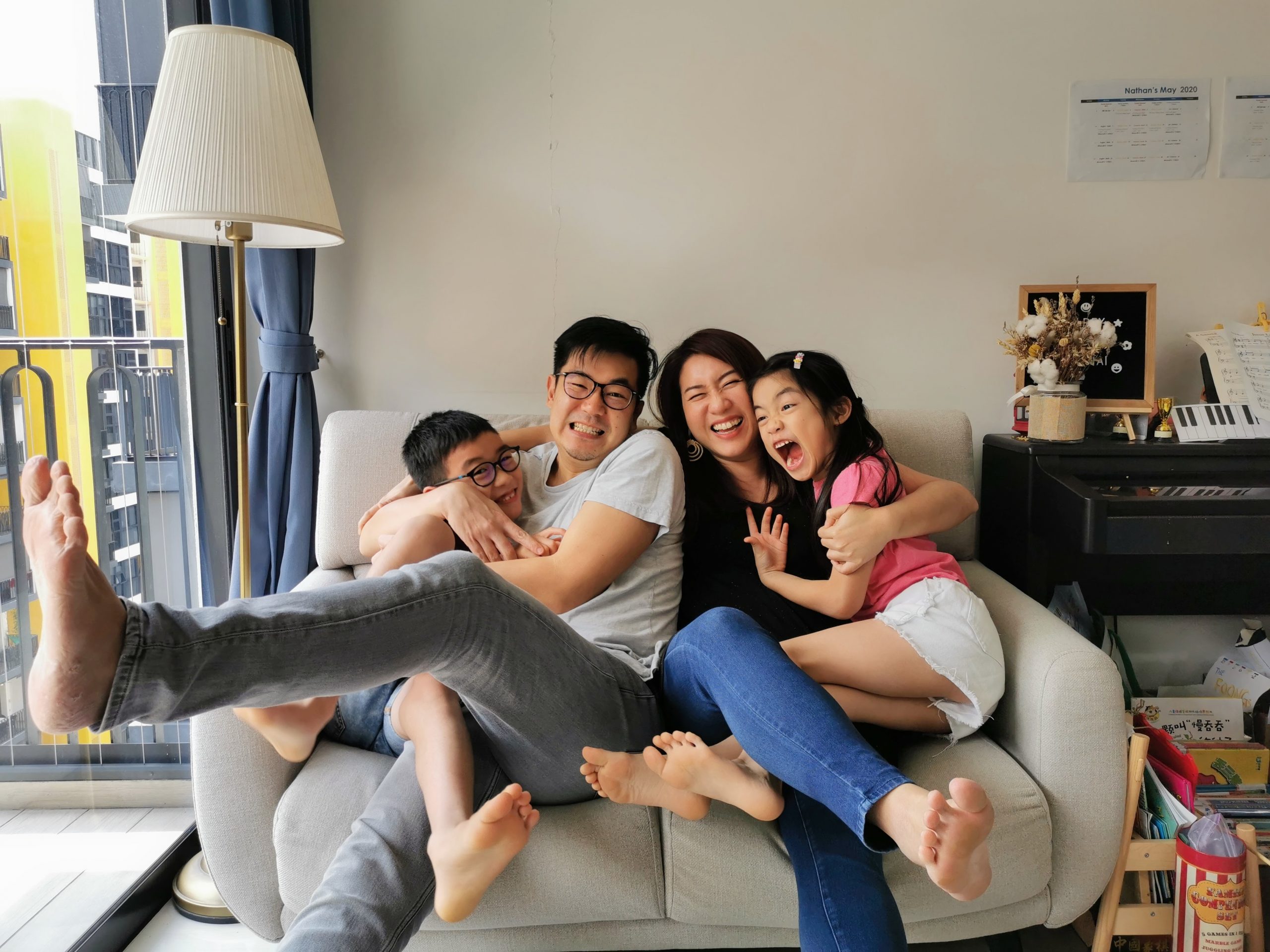I am an Asian mum but I’m opting out of the Tiger Mum race
Esther Foong // August 13, 2021, 7:16 pm

"As an Asian mum, I hope that the kids' report cards are filled with stars and A's," admits ex-teacher Esther Foong. Yet to her and her husband, Elvin, their children's character is far more important than their competency. All photos courtesy of the Foong family.
Can I be honest? One of my biggest struggles when my kids were in pre-school was standing among the parents at dismissal and listening to them discuss which tuition or enrichment centres to attend, and how their children can read this, count that and create those.
As a mum, I want my children to be their best, and by “their best” I mean they should be the best among their peers (I am an Asian mum, after all).
I hope that the report card at the end of every school term is filled with stars and A’s. And what’s the point of going for a competition if you’re not going to win it?
You might think then, that the foregone conclusion for my husband, Elvin, and me when it comes to the question of whether tuition is necessary is “Yes”.
As a mum, I want my children to be their best … And what’s the point of going for a competition if you’re not going to win it?
You’ll be surprised to learn that we have decided that we will not send our kids for tuition classes.
So what led to this decision?
As an educator who served in a government primary school for more than a decade, I have seen how “over-learning” has affected our students.
I’ve witnessed how, at Primary 1, children who have already learned ahead of and beyond the curriculum because of tuition were bored in class. Because they already knew what the teacher was teaching, they acquired the habit of tuning out and not listening, and possibly even developed an attitude of “I know better” or “I know more than you.”
In more serious cases, I’ve had to deal with students who started misbehaving out of boredom, and their respect for teachers was largely reduced.

Though they want to see their children do well academically, Esther and Elvin decided against sending their two primary school age children for tuition classes.
At the same time, usually by mid-P2, all the over-learnt content would be depleted.
The child now struggles with not being able to concentrate in class (because they never learnt the skill of listening), examination skills were not learnt well, and results may start to dip.
And when more challenging applications like writing compositions, and a new subject (Science) enters the scene in Primary 3, we see parents scrambling to search for even more tuition classes – adjusting their family schedule around academic development – and a child who feels like he had failed and now has lesser playtime because he has to make up for the dip in grades.
To tuition or not to tuition?
To set the record straight, I am not saying tuition is inherently bad. However, when it comes to tuition, we have to assess the need and the intention for tuition.
Who is tuition for?
What is tuition for?
When should our child go for tuition?
Why is our child going for tuition?
When I was teaching, there were times I had to recommend tuition to certain families as the child required additional support in the subject.

When the Foongs had to self isolate under a leave of absence (LOA) request last year, Elvin and Esther set up “Naph School” at home – “Naph” being an amalgam of the first two letters of the children’s names.
Some reasons were: The pace in class was faster than what the child could handle and he was struggling with catching up; the parents were unable to help him in the subject as they were inadequate in it; or the degree of the emotional impact on the child due to the struggle in the subject was high.
I am not saying tuition is inherently bad. However, we have to assess the need and the intention for tuition.
Here’s the interesting part: I was assessing the child’s ability in the subject based on a combination of factors – grades, participation in class, emotional and social impact, whether the child enjoys the subject, or how it may affect the child in the future.
It is largely pegged to what I see at that point and what I feel is the potential of this child in acquiring this subject and whether there is a need for stretching.
And my assessment as an educator on the potential of attaining “maximum success” may be different from that of a parent.
“Nothing to improve on?” “She is really okay? But she only got a B.”
So the teacher feels that “B” is ok, because maybe this child has been improving steadily, or maybe from the teacher’s observation, this is currently the “biting point” and should be maintained for a season. For the parent, the bar could be higher.
(In car analogy, the “biting point” is the the point when a vehicle’s clutch becomes engaged and the vehicle can start to move.)
Training up a Proverbs 22 child
This brings me to consider the well-known and oft-quoted verse in Proverbs 22:6: Train up a child in the way he should go, And when he is old he will not depart from it.
Many times, we focus on the part of the verse that says “train up a child”. So we keep finding ways to train and make our children “better”. We are serious about our role as parents; God has placed us as stewards over these little ones.
However, let us not neglect the condition God has set for this training: “In the way he should go.”
When we consider that God created each child uniquely, we can then start to see God’s bigger purpose for their lives.
When Elvin and I run our Faith At Home workshops, we often ask participants to consider this: If our children are arrows and we are the archers (Psalm 127:4), what is the target we are aiming them at?
Should it be the target of our own hopes and aspirations? Or the target of societal standards and expectations? What about the target of our own unfulfilled dreams? Or should we be aiming instead at the unique destiny our Creator has for each and every one of our children?
The issue of tuition is therefore peripheral to the more fundamental question: In which way should my child go?
To answer this question, parents, let me firstly encourage you to take some time to observe your child this week. What is the topic that he or she most talks about? What does your child enjoy doing the most? What is he or she good at, or requires support for? When do your child’s eyes light up in curiosity? What causes him or her to feel defeated?
When we consider that God created each child uniquely, we can then start to see their natural proclivities and talents as also unique to them – a sign of God’s bigger purpose for their lives, and an indicator of the way they should go.
As parents, we can pray and think about how best we can support and develop them in these areas.
Raising straight arrows
Before we send our kids for tuition and enrichment courses to grow these talent/passion areas, we should be even more intentional in making sure that we give even more time, energy, and attention to their character.
At every Parent-Teacher Conference, Elvin and I ask our children’s teachers only three questions:
- Does my child relate well with his/her classmates?
- Does my child show respect to his/her teachers?
- Does my child have an attitude of wanting to learn?
That doesn’t mean we’re not interested in their academic performance. But, for us, how they relate with others and the attitude that they possess will determine whether they eventually do well or not.
Competency may help our arrows fly fast. But character is what helps our arrows fly straight. And ultimately, we want our arrows to hit the right, God-given target.

To the Foongs, training up a child in the way he should go (Proverbs 22:6) takes into account considering the unique destiny our Creator has for each child.
So, if you’re reading this article hoping for a definitive answer of whether or not you should send your kids for tuition, I’m afraid you won’t find it here.
As stewards of the children God has given you, you will have to determine your child’s ability to learn, the areas that need strengthening and support, and whether tuition is the answer.
Competency may help our arrows fly fast. But character is what helps our arrows fly straight.
At the end of the day, it all boils down to this: How well do I know my child?
As for my husband and I, we knew we made the right choice not to send our kids for tuition the day that Nathan came back telling me how cool multiplication was, and the time that Phoebe laughed at her silly spelling mistake and took to writing it out a few more times to make sure she wouldn’t spell it wrongly again.
Their passion for learning and their natural ability to discover what they’re good at should be allowed to run their own course.
Will we change our minds and send them for tuition someday? Sure, as long as we are clear that this is an area of support that they need.
Ultimately, it’s the foundation of Character that we have been building, and will continue to work on, until the day comes when we can finally release the arrows from our bows, knowing full well that we have not only trained up our children, but we have also pointed them in the way that they should go.
RELATED STORY:
We are an independent, non-profit organisation that relies on the generosity of our readers, such as yourself, to continue serving the kingdom. Every dollar donated goes directly back into our editorial coverage.
Would you consider partnering with us in our kingdom work by supporting us financially, either as a one-off donation, or a recurring pledge?
Support Salt&Light




